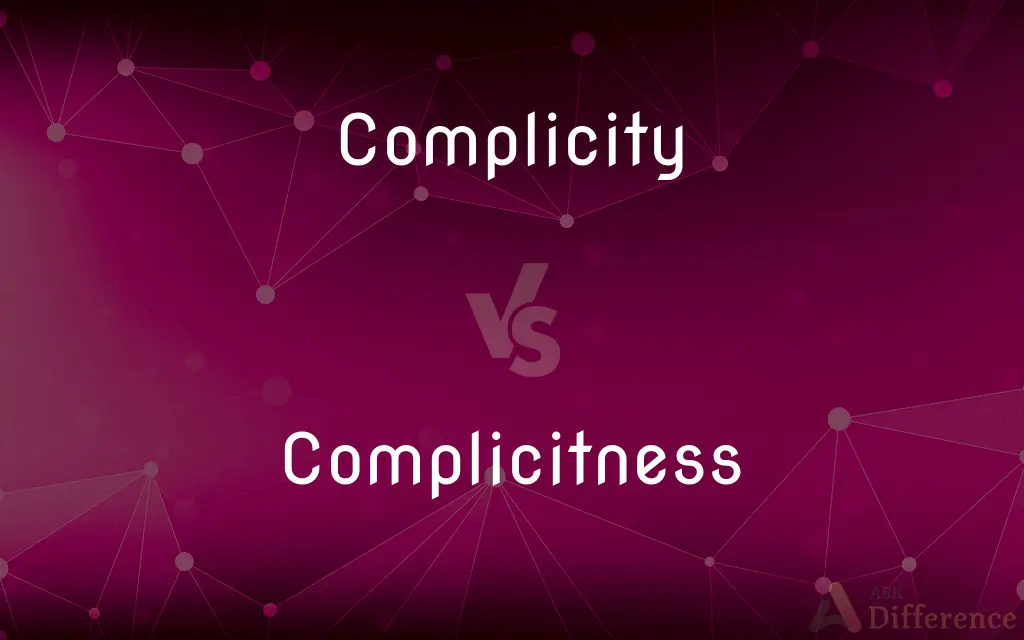Complicity vs. Complicitness — What's the Difference?
By Urooj Arif & Fiza Rafique — Updated on March 11, 2024
Complicity refers to involvement as a partner or accomplice in a wrongful act, while complicitness is a less commonly used term that conveys a similar meaning of being complicit or involved in wrongdoing.

Difference Between Complicity and Complicitness
Table of Contents
ADVERTISEMENT
Key Differences
Complicity is a well-established term in legal and moral contexts, denoting the state of being involved with others in an unlawful or unethical act. It implies a degree of partnership or collaboration in the wrongdoing, where the individual may not be the principal offender but shares responsibility due to their contribution or support. Complicitness, on the other hand, is a variant that conveys the quality or state of being complicit. While it carries a similar meaning, it is less frequently used and might be considered more stylistic or nuanced in its application.
Both terms underscore the concept of shared responsibility in a negative act, highlighting that involvement in wrongdoing isn't limited to those who directly commit the act. However, complicity is more likely to be found in legal documents, formal discussions, and academic texts, due to its established usage and clear connotations. Complicitness might appear in more varied contexts, possibly to emphasize the ethical or moral dimensions of being complicit, beyond just legal culpability.
The usage of complicity often implies a level of knowledge and intent regarding the wrongful act, suggesting that the individual was aware of the wrongdoing and chose to participate or enable it in some way. Complicitness, embodying the state of being complicit, also carries this implication but may place a stronger emphasis on the moral or ethical stance of the individual involved.
In practical terms, when addressing responsibility in a wrongdoing, the term complicity is more likely to be used to assert a clear and defined involvement. Complicitness might be employed for nuanced discussions, perhaps in literary, philosophical, or reflective contexts, where the focus is on exploring the depths of moral involvement and the complexities of ethical responsibility.
Despite their slight differences in usage and frequency, the fundamental message conveyed by both terms is the importance of recognizing and addressing the roles individuals play in supporting or perpetuating wrongful acts, whether through direct action, consent, or silent acquiescence.
ADVERTISEMENT
Comparison Chart
Definition
Involvement in a wrongful act as a partner or accomplice.
The state of being complicit or involved in wrongdoing.
Usage
More common, especially in legal and formal contexts.
Less common, more stylistic or nuanced.
Connotation
Emphasizes legal and moral responsibility.
May emphasize the ethical or moral dimensions of being complicit.
Implication
Suggests knowledge and intent regarding the wrongdoing.
Carries a similar implication, with a potential focus on ethical stance.
Contexts
Legal documents, academic texts, formal discussions.
Varied contexts, including literary, philosophical, or reflective discussions.
Compare with Definitions
Complicity
Participation in wrongdoing with others.
His complicity in the scheme was proven through emails.
Complicitness
Less commonly used, with a nuanced application.
The novel explores the theme of complicitness in societal norms.
Complicity
Suggests a partnership in the wrongful act.
Their complicity in the fraud led to severe penalties.
Complicitness
The quality of being complicit in wrongdoing.
His complicitness in the affair cast a shadow over his integrity.
Complicity
Often carries legal implications.
The court found her complicity in the crime undeniable.
Complicitness
Useful in discussions focusing on moral responsibility.
The debate highlighted the community's complicitness in maintaining the status quo.
Complicity
Can be active or passive.
His silence constituted complicity in the ongoing injustice.
Complicitness
May emphasize the ethical dimensions of involvement.
The documentary delves into the complicitness of bystanders in bullying scenarios.
Complicity
Recognized in various contexts for assigning responsibility.
The investigation revealed the company's complicity in environmental violations.
Complicitness
Can reflect a moral or philosophical inquiry.
Her essays examine the complicitness inherent in consumer culture.
Complicity
Complicity is the participation in a completed criminal act of an accomplice, a partner in the crime who aids or encourages (abets) other perpetrators of that crime, and who shared with them an intent to act to complete the crime. A person is an accomplice of another person in the commission of a crime if they purpose the completion of a crime, and toward that end, if that person solicits or encourages the other person, or aids or attempts to aid in planning or committing the crime, or has legal duty to prevent that crime but fails to make an effort to prevent it properly.Unlike attempt, solicitation, and conspiracy, which are crimes in and of themselves, complicity is not itself a crime but is a way of committing a crime.
Complicitness
The quality of being complicit.
Complicity
Involvement as an accomplice in a questionable act or a crime.
Complicity
The state of being complicit; involvement as a partner or accomplice, especially in a crime or other wrongdoing.
Complicity
(archaic) Complexity.
Complicity
The state of being an accomplice; participation in guilt.
Complicity
Guilt as an accomplice in a crime or offense
Common Curiosities
What does complicity mean?
Complicity refers to involvement in a wrongful act alongside others, sharing responsibility.
Can someone be held legally accountable for complicity?
Yes, individuals can be held legally accountable for their complicity in a crime or wrongful act.
How does society view complicity and complicitness?
Both are generally viewed negatively, as they involve sharing responsibility in unethical or illegal acts.
Is it possible to be complicit by omission?
Yes, failing to act or speak out against a wrongdoing can constitute complicity or complicitness.
Are there degrees of complicity or complicitness?
Yes, the extent of one's involvement can vary, affecting the degree of responsibility and culpability.
Does complicitness require intentional involvement?
Intentional involvement often strengthens the case for complicitness, but passive or unintentional enabling can also contribute.
Can complicitness be a theme in literature?
Yes, complicitness is often explored as a theme in literature, focusing on the ethical and moral complexities of involvement in wrongdoing.
How can one avoid complicity or complicitness?
Avoiding complicity involves active awareness, ethical decision-making, and often speaking out or acting against wrongdoing.
What is complicitness?
Complicitness denotes the state or quality of being complicit or involved in wrongdoing.
How are complicity and complicitness used differently?
Complicity is commonly used, especially in formal contexts, while complicitness is less common and may convey nuanced ethical implications.
Does complicitness always imply direct involvement in a wrongdoing?
Not necessarily direct involvement; it can also refer to indirect support or enabling of wrongdoing through action or inaction.
Can organizations or entities be complicit?
Yes, organizations can be complicit in wrongful acts, especially through policies, practices, or cultural norms that enable wrongdoing.
How can complicity be proven?
Proving complicity typically involves demonstrating knowledge of, intent in, and some form of participation or enabling of the wrongful act.
How can complicity and complicitness impact one's reputation?
Being associated with wrongdoing through complicity or complicitness can significantly damage an individual's or organization's reputation.
Is ignorance a defense against complicity?
Genuine ignorance may be a defense, but willful ignorance or deliberate avoidance of the truth is often not sufficient to absolve one of complicity.
Share Your Discovery

Previous Comparison
Condensation vs. Fog
Next Comparison
Content vs. MeagerAuthor Spotlight
Written by
Urooj ArifUrooj is a skilled content writer at Ask Difference, known for her exceptional ability to simplify complex topics into engaging and informative content. With a passion for research and a flair for clear, concise writing, she consistently delivers articles that resonate with our diverse audience.
Co-written by
Fiza RafiqueFiza Rafique is a skilled content writer at AskDifference.com, where she meticulously refines and enhances written pieces. Drawing from her vast editorial expertise, Fiza ensures clarity, accuracy, and precision in every article. Passionate about language, she continually seeks to elevate the quality of content for readers worldwide.














































